人教新目标版英语八年级>Unit 3 Could you please clean your room?单词课件(23张PPT无素材)
文档属性
| 名称 | 人教新目标版英语八年级>Unit 3 Could you please clean your room?单词课件(23张PPT无素材) |
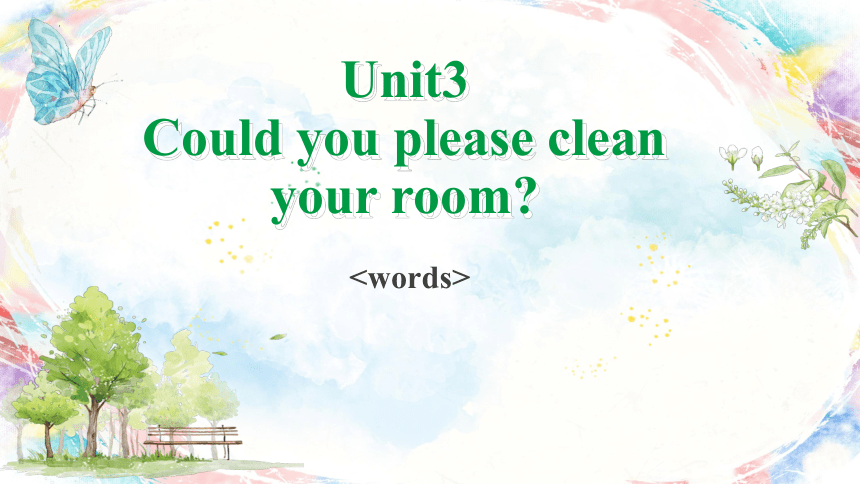
|
|
| 格式 | pptx | ||
| 文件大小 | 4.9MB | ||
| 资源类型 | 教案 | ||
| 版本资源 | 人教新目标(Go for it)版 | ||
| 科目 | 英语 | ||
| 更新时间 | 2022-03-27 00:00:00 | ||
图片预览

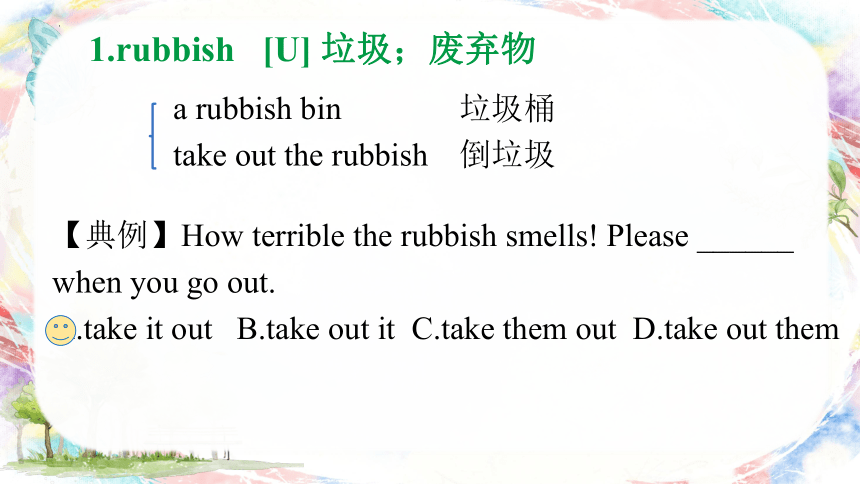
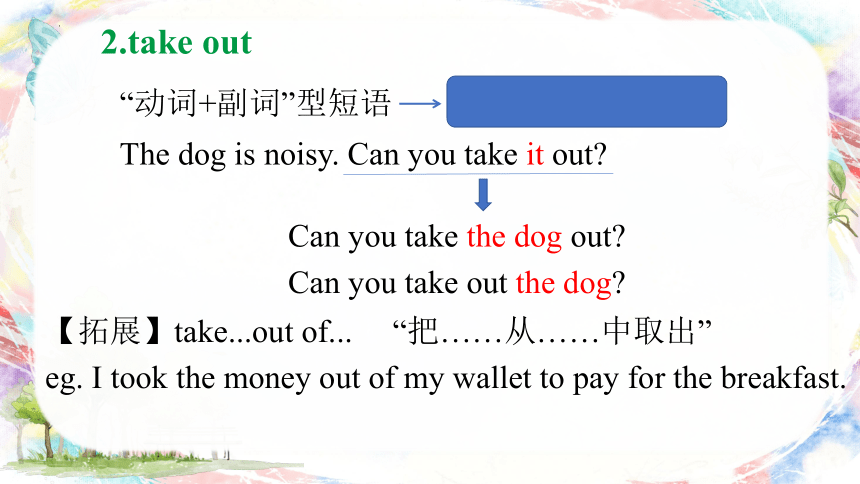
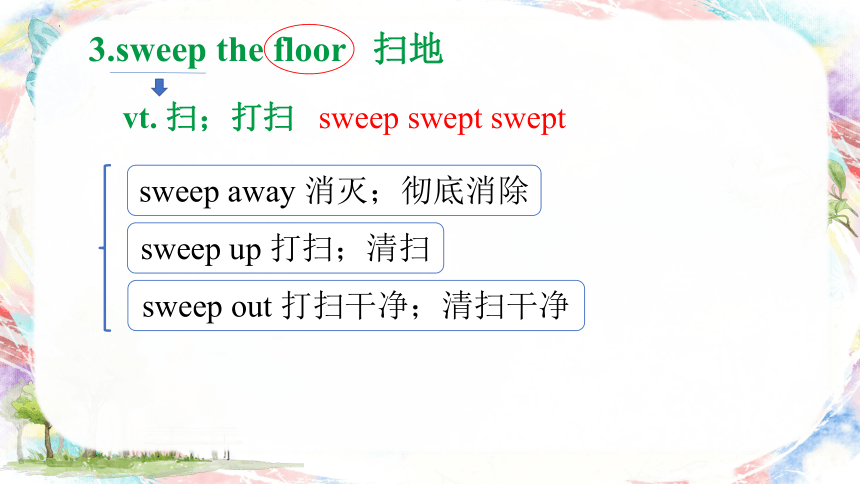
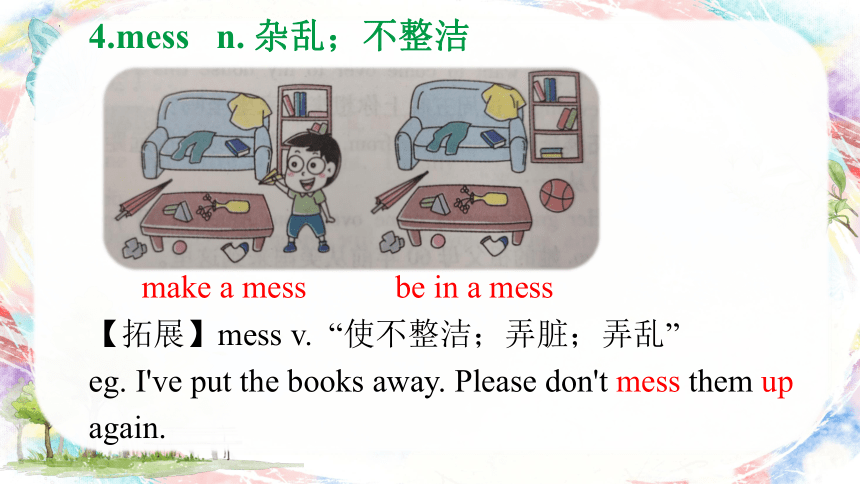
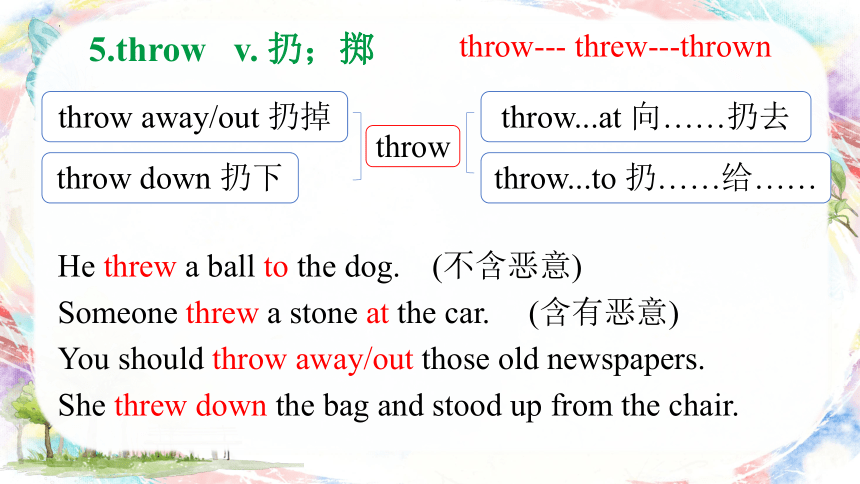
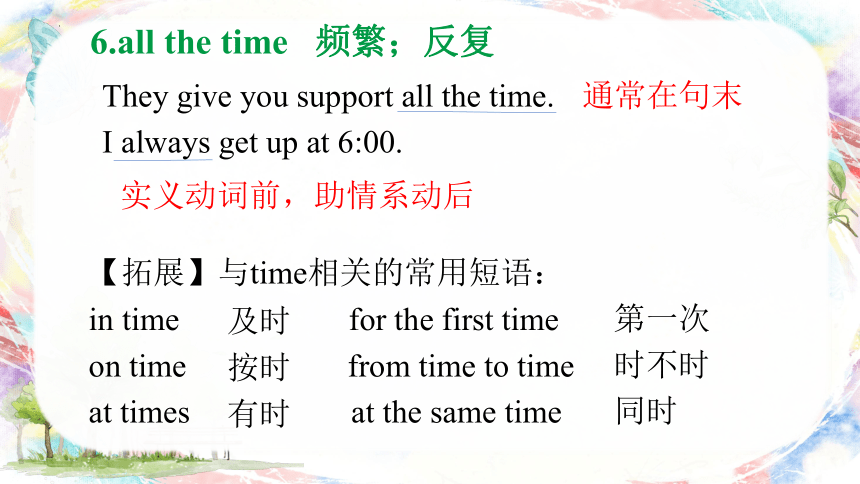
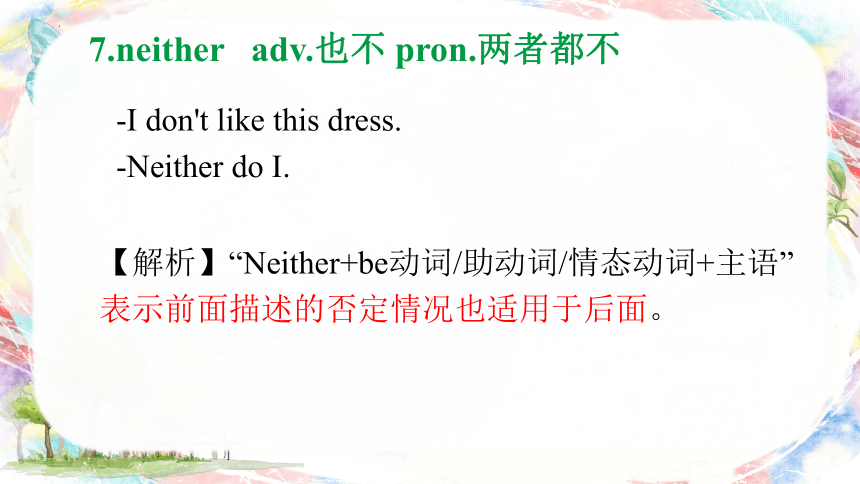
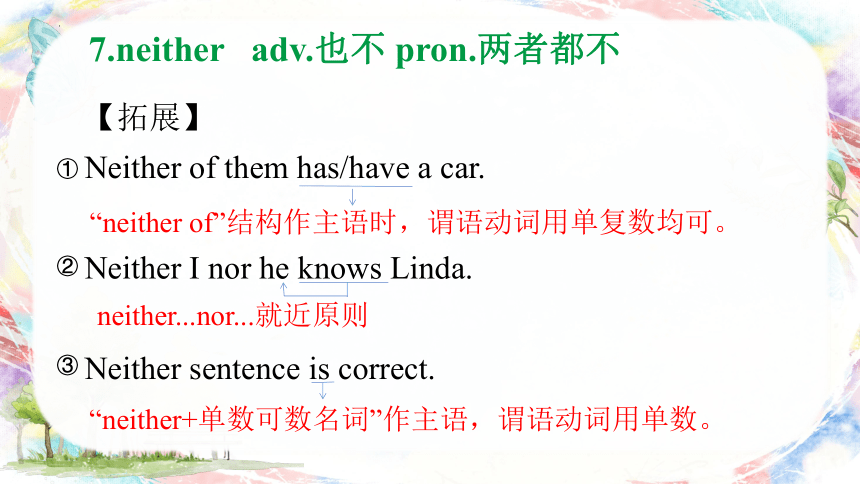
文档简介
(共23张PPT)
Unit3
Could you please clean your room
1.rubbish [U] 垃圾;废弃物
a rubbish bin
take out the rubbish
【典例】How terrible the rubbish smells! Please ______ when you go out.
A.take it out B.take out it C.take them out D.take out them
垃圾桶
倒垃圾
“动词+副词”型短语 “名两边,代中间”
The dog is noisy. Can you take it out
2.take out
Can you take the dog out
Can you take out the dog
【拓展】take...out of... “把……从……中取出”
eg. I took the money out of my wallet to pay for the breakfast.
3.sweep the floor 扫地
sweep swept swept
vt. 扫;打扫
sweep away 消灭;彻底消除
sweep up 打扫;清扫
sweep out 打扫干净;清扫干净
4.mess n. 杂乱;不整洁
make a mess be in a mess
【拓展】mess v. “使不整洁;弄脏;弄乱”
eg. I've put the books away. Please don't mess them up again.
5.throw v. 扔;掷
throw--- threw---thrown
He threw a ball to the dog.
Someone threw a stone at the car.
You should throw away/out those old newspapers.
She threw down the bag and stood up from the chair.
throw away/out 扔掉
throw...at 向……扔去
throw...to 扔……给……
throw down 扔下
throw
(不含恶意)
(含有恶意)
6.all the time 频繁;反复
【拓展】与time相关的常用短语:
in time for the first time
on time from time to time
at times at the same time
及时
按时
有时
第一次
时不时
同时
They give you support all the time.
I always get up at 6:00.
通常在句末
实义动词前,助情系动后
7.neither adv.也不 pron.两者都不
-I don't like this dress.
-Neither do I.
【解析】“Neither+be动词/助动词/情态动词+主语”表示前面描述的否定情况也适用于后面。
7.neither adv.也不 pron.两者都不
【拓展】
Neither of them has/have a car.
Neither I nor he knows Linda.
Neither sentence is correct.
“neither of”结构作主语时,谓语动词用单复数均可。
neither...nor...就近原则
“neither+单数可数名词”作主语,谓语动词用单数。
①
②
③
8.as soon as 一……就……
①He will call me as soon as he comes back.
②You can go as soon as he comes.
③Call me as soon as you reach home.
as soon as引导的时间状语从句,符合“主将从现,主情从现,主祈从现”。
④As soon as we arrived there, we started to work.
指紧接着发生的两个短动作,主从句都用一般过去时。
9.pass v.给;递;走过;通过
He passed me the magazine.
=He passed the magazine to me.
pass sb. sth.=pass sth. to sb.
走过;通过
及格;合格
(时间)过去;流逝
Cars were unable to pass the narrow road.
She passed the exam.
The days passed slowly.
10.borrow&lend
【语境串记】
Nick borrowed a book from the library and he lent it to me. He told me that I could keep it for a week.
lend sth. to sb.=lend sb. sth.
11.hate v. 厌恶;讨厌 近义词 dislike 反义词 love
I hate Monday mornings.
hate+n./pron.
I hate to shop/shopping on a rainy day.
hate to do sth./doing sth
①
②
12.while conj. 与……同时;当……时候;而;然而
While I was doing my homework, my father was reading a book.
连词,“当……时候”,强调从句动作发生的同时,主句动作也在进行。
I like reading books, while my little brother likes playing.
连词,“而;然而”,强调两者之间的对比。
①
②
13.stress n. 精神压力;心理负担
stress还可作名词,意为“重音”。
人们找到了不同的方法来应对压力。
People found different ways to deal with stress/stresses.
stress既可作可数名词,也可作不可数名词。
重音落在第二个音节上。
The stress falls on the second syllable.
①
②
14.waste n.浪费;垃圾 v.浪费;滥用
It's a waste of time to shop all day.
a waste of+n. 浪费...
Don't waste your time (in) shopping all day.
waste time/money (in) doing sth. 浪费时间/金钱做某事
①
②
15.anyway adv. 而且;加之
anyway作副词,用于表示追加评论。
It's so expensive. And anyway, the size is too small.
Anyway, we should have a try.
anyway作副词,还可意为“不管怎样;尽管如此”。
①
②
16.depend v. 依靠;信赖
“依靠;信赖”,主语通常是表示人的名词或代词。
The little boy depends on his mother very much.
-Which bicycle should I choose, sir
-It depends on what you want to use it for.
“取决于;视……而定”。It/That depends意为“那得看情况”。
independence n.独立
independent adj.独立的
①
②
17.develop v. 发展;壮大
发展
Technology is developing fast.
The child developed eye disease when he was two.
I think one of the best ways to keep healthy is to develop good eating habits.
患(病)
养成(习惯)
①
②
③
【拓展】development n. developed adj. developing adj.
Japan is a developed country and China is a developing country.
18.fairness n. 公正性;合理性
【拓展】fairness相关词汇
fair adj. 公正的
unfairness n. 不公平;不合理
fairness n. 公平性;合理性
unfair adj. 不公正的
反义词
反义词
名词
名词
19.since conj. 因为;既然
prep., conj.&adv.从……以后;自……以来
Since you don't know the boy, I'll ask someone else.
既然你不认识那个男孩,我就问问其他人吧。
Mary hasn't phoned since she went to Shanghai.
玛丽自从去了上海还没有打来过电话。
“因为;既然”,引导原因状语从句,常位于句首。
“从……以后”,引导时间状语从句,从句常用一般过去时,主句多用现在完成时。
①
②
20.drop v. 落下;掉下
The apples dropped from the tree.
Why did Brian drop out of school
Drops of rain fell on the stone.
可作及物动词和不及物动词,侧重由于地球引力或没有握住而“落下”。
drop作动词,意为“放弃,停止”。
drop作名词,意为“水滴”
辍学
③
①
②
Thank you for listening!
Unit3
Could you please clean your room
1.rubbish [U] 垃圾;废弃物
a rubbish bin
take out the rubbish
【典例】How terrible the rubbish smells! Please ______ when you go out.
A.take it out B.take out it C.take them out D.take out them
垃圾桶
倒垃圾
“动词+副词”型短语 “名两边,代中间”
The dog is noisy. Can you take it out
2.take out
Can you take the dog out
Can you take out the dog
【拓展】take...out of... “把……从……中取出”
eg. I took the money out of my wallet to pay for the breakfast.
3.sweep the floor 扫地
sweep swept swept
vt. 扫;打扫
sweep away 消灭;彻底消除
sweep up 打扫;清扫
sweep out 打扫干净;清扫干净
4.mess n. 杂乱;不整洁
make a mess be in a mess
【拓展】mess v. “使不整洁;弄脏;弄乱”
eg. I've put the books away. Please don't mess them up again.
5.throw v. 扔;掷
throw--- threw---thrown
He threw a ball to the dog.
Someone threw a stone at the car.
You should throw away/out those old newspapers.
She threw down the bag and stood up from the chair.
throw away/out 扔掉
throw...at 向……扔去
throw...to 扔……给……
throw down 扔下
throw
(不含恶意)
(含有恶意)
6.all the time 频繁;反复
【拓展】与time相关的常用短语:
in time for the first time
on time from time to time
at times at the same time
及时
按时
有时
第一次
时不时
同时
They give you support all the time.
I always get up at 6:00.
通常在句末
实义动词前,助情系动后
7.neither adv.也不 pron.两者都不
-I don't like this dress.
-Neither do I.
【解析】“Neither+be动词/助动词/情态动词+主语”表示前面描述的否定情况也适用于后面。
7.neither adv.也不 pron.两者都不
【拓展】
Neither of them has/have a car.
Neither I nor he knows Linda.
Neither sentence is correct.
“neither of”结构作主语时,谓语动词用单复数均可。
neither...nor...就近原则
“neither+单数可数名词”作主语,谓语动词用单数。
①
②
③
8.as soon as 一……就……
①He will call me as soon as he comes back.
②You can go as soon as he comes.
③Call me as soon as you reach home.
as soon as引导的时间状语从句,符合“主将从现,主情从现,主祈从现”。
④As soon as we arrived there, we started to work.
指紧接着发生的两个短动作,主从句都用一般过去时。
9.pass v.给;递;走过;通过
He passed me the magazine.
=He passed the magazine to me.
pass sb. sth.=pass sth. to sb.
走过;通过
及格;合格
(时间)过去;流逝
Cars were unable to pass the narrow road.
She passed the exam.
The days passed slowly.
10.borrow&lend
【语境串记】
Nick borrowed a book from the library and he lent it to me. He told me that I could keep it for a week.
lend sth. to sb.=lend sb. sth.
11.hate v. 厌恶;讨厌 近义词 dislike 反义词 love
I hate Monday mornings.
hate+n./pron.
I hate to shop/shopping on a rainy day.
hate to do sth./doing sth
①
②
12.while conj. 与……同时;当……时候;而;然而
While I was doing my homework, my father was reading a book.
连词,“当……时候”,强调从句动作发生的同时,主句动作也在进行。
I like reading books, while my little brother likes playing.
连词,“而;然而”,强调两者之间的对比。
①
②
13.stress n. 精神压力;心理负担
stress还可作名词,意为“重音”。
人们找到了不同的方法来应对压力。
People found different ways to deal with stress/stresses.
stress既可作可数名词,也可作不可数名词。
重音落在第二个音节上。
The stress falls on the second syllable.
①
②
14.waste n.浪费;垃圾 v.浪费;滥用
It's a waste of time to shop all day.
a waste of+n. 浪费...
Don't waste your time (in) shopping all day.
waste time/money (in) doing sth. 浪费时间/金钱做某事
①
②
15.anyway adv. 而且;加之
anyway作副词,用于表示追加评论。
It's so expensive. And anyway, the size is too small.
Anyway, we should have a try.
anyway作副词,还可意为“不管怎样;尽管如此”。
①
②
16.depend v. 依靠;信赖
“依靠;信赖”,主语通常是表示人的名词或代词。
The little boy depends on his mother very much.
-Which bicycle should I choose, sir
-It depends on what you want to use it for.
“取决于;视……而定”。It/That depends意为“那得看情况”。
independence n.独立
independent adj.独立的
①
②
17.develop v. 发展;壮大
发展
Technology is developing fast.
The child developed eye disease when he was two.
I think one of the best ways to keep healthy is to develop good eating habits.
患(病)
养成(习惯)
①
②
③
【拓展】development n. developed adj. developing adj.
Japan is a developed country and China is a developing country.
18.fairness n. 公正性;合理性
【拓展】fairness相关词汇
fair adj. 公正的
unfairness n. 不公平;不合理
fairness n. 公平性;合理性
unfair adj. 不公正的
反义词
反义词
名词
名词
19.since conj. 因为;既然
prep., conj.&adv.从……以后;自……以来
Since you don't know the boy, I'll ask someone else.
既然你不认识那个男孩,我就问问其他人吧。
Mary hasn't phoned since she went to Shanghai.
玛丽自从去了上海还没有打来过电话。
“因为;既然”,引导原因状语从句,常位于句首。
“从……以后”,引导时间状语从句,从句常用一般过去时,主句多用现在完成时。
①
②
20.drop v. 落下;掉下
The apples dropped from the tree.
Why did Brian drop out of school
Drops of rain fell on the stone.
可作及物动词和不及物动词,侧重由于地球引力或没有握住而“落下”。
drop作动词,意为“放弃,停止”。
drop作名词,意为“水滴”
辍学
③
①
②
Thank you for listening!
同课章节目录
- Unit 1 What's the matter?
- Section A
- Section B
- Unit 2 I'll help to clean up the city parks.
- Section A
- Section B
- Unit 3 Could you please clean your room?
- Section A
- Section B
- Unit 4 Why don't you talk to your parents?
- Section A
- Section B
- Unit 5 What were you doing when the rainstorm came
- Section A
- Section B
- Review of Units 1-5
- Unit 6 An old man tried to move the mountains.
- Section A
- Section B
- Unit 7 What's the highest mountain in the world?
- Section A
- Section B
- Unit 8 Have you read Treasure Island yet?
- Section A
- Section B
- Unit 9 Have you ever been to a museum?
- Section A
- Section B
- Unit 10 I've had this bike for three years.
- Section A
- Section B
